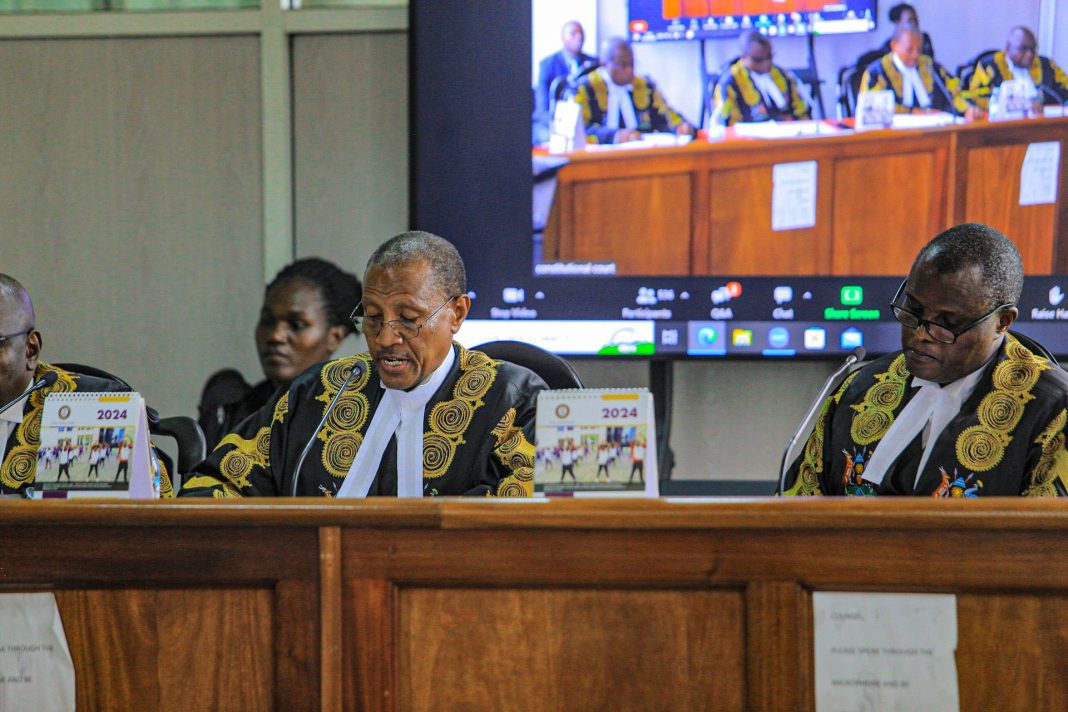The Constitutional Court has declined to nullify the Anti-Homosexuality Act enacted by Parliament in 2023 in its entirety.
The decision was delivered by a panel of five Justices led by the Deputy Chief Justice, Hon. Justice Richard Buteera; Justice Geofrey Kiryabwire, Justice Monica Mugenyi, Justice Kibeedi Muzamiru, Justice Christopher Gashirabake.
“We decline to nullify the Anti-Homosexuality Act 2023 in its entirety neither would we grant a permanent injunction against its enforcement,” Justice Richard Buteera said.
The Court nullified Sections 3(2) (c), 9, 11(2)(d) and 14 of the Anti-Homosexuality Act, 2023 for contravening the Constitution of Uganda, 1995.
The nullified Sections had criminalized the letting of premises for use for homosexual purposes, the failure by anyone to report acts of homosexuality to the Police for appropriate action, and the engagement in acts of homosexuality by anyone which results in the other person contracting a terminal illness.
The court dismissed claims that the Anti-Homosexuality Act violates the right to practice business and profession by restricting content promoting homosexuality, saying the law aims to uphold societal morals by limiting the use of media to publish or broadcast offensive material.
“Evidence on record is that the Anti-Homosexuality Act was enacted against the backdrop of the recruitment of children into the practice of homosexuality,” said Butera, adding, “That is the mischief that Section 11 of the Act seeks to address.”
In 2023, the Parliament of Uganda passed the Anti-Homosexuality Act following the public outcry, social and broadcast media discussions and homosexuality victims’ ‘painful and gruelling stories’ of children and families that were ‘dying in silence’ from the psychological trauma of forced recruitment of children into homosexual acts. The Act criminalised homosexuality, its recognition, promotion, financing and normalisation.
As soon as the President of Uganda assented to the Anti-Homosexuality law on the 26th of May 2023, four Constitutional Petitions were filed in the Constitutional Court by a total of 22 private citizens and human rights activists challenging virtually all the seventeen sections of the Anti-Homosexuality Act for their alleged contravention of human rights and freedoms that are guaranteed under the Uganda Constitution, and international human rights instruments to which Uganda is a party.
The Petitions were opposed by the Attorney General of Uganda, Pastor Martin Sempa, Eng. Stephen Langa and the Family Life Network Limited. Court also did benefit from an amicus brief filed by the Secretariat of the Joint United Nations Programme on HIV/ AIDS (UNAIDS).
In coming to its decision, the Constitutional Court considered the following:
1. The legislations and judicial decisions from sister jurisdictions that have decriminalised consensual homosexuality between adults in private space.
2. The absence of consensus at the global level regarding non-discrimination based sexual orientation, gender identity, gender expression and sex characteristics (SOGIESC). This is reflected in the fact that to date non-discrimination on the basis of the SOGIESC variables has not explicitly found its way into international human rights treaties. Instead, it has been ‘vetoed’ by a bloc of resistant (UN) member states that has prevented the adoption of a binding declaration or similar instrument to strengthen protections for LGBTI human rights.
3. The conflict in international human rights law between upholding a universal understanding of human rights and respecting the diversity and freedom of human cultures, with no one culture entirely diminishing the dignities of the other.
4. The conflict between individuals’ right to self-determination, self-perception and bodily autonomy, on the one hand; and the communal or societal right to social, political and cultural self-determination, calling for a delicate balance between individual autonomy and communal interests.
5. The recent developments in the human rights jurisprudence including the decision of the US Supreme Court in Dobbs v Jackson Women’s Health Organisation, No. 19-1392, 597 U.S. 215 (2022), where the Court considered the nation’s history and traditions, as well as the dictates of democracy and rule of law, to over-rule the broader right to individual autonomy.
6. The uniqueness of Uganda’s Constitution which obliges the courts of law to take into account the country’s socio-cultural norms, values and aspirations when resolving any disputes before them.
7. The Anti-Homosexuality Act being, in general, a reflection of the socio-cultural realities of the Ugandan society, and was passed by an overwhelming majority of the democratically elected representatives of the Ugandan citizens.







